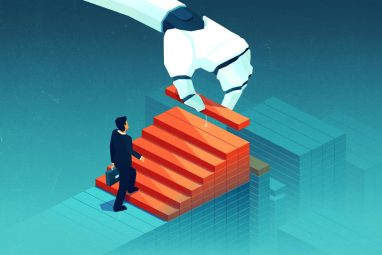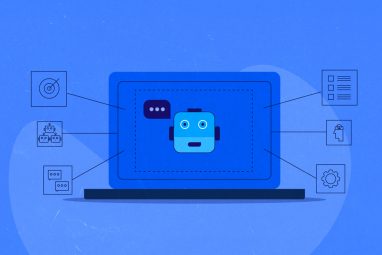Navigating Generative AI's Potential in Your Enterprise
Experts discuss the challenges and opportunities associated with positioning this technology and the critical role of human oversight and education.
Topics
NEXTTECH
News
- Identity-based Attacks Account for 60% of Leading Cyber Threats, Report Finds
- CERN and Pure Storage Partner to Power Data Innovation in High-Energy Physics
- CyberArk Launches New Machine Identity Security Platform to Protect Cloud Workloads
- Why Cloud Security Is Breaking — And How Leaders Can Fix It
- IBM z17 Mainframe to Power AI Adoption at Scale
- Global GenAI Spending to Hit $644 Billion by 2025, Gartner Projects

[Image source: Krishna Prasad/MITSMR Middle East]
Generative AI (GenAI) is ubiquitous and rapidly shifting in businesses and everyday life. The Dell Technologies Innovation Catalyst Research highlights how most organizations believe it is a game changer, with 81% agreeing that GenAI will significantly transform their industry and 82% agreeing that there will be greater human-machine partnership within five years.
GenAI significantly alters industry landscapes by automating complex tasks traditionally requiring human creativity and effort. The applications are endless, from GenAI predicting molecular interactions to hastening drug discovery to forecasting environmental impacts to improve urban climate management.
Jay Sadiq, Founder of Fortyguard says how the company’s Temperature Operating System (tOS) uses AI to enhance urban climate management by modeling and predicting environmental impacts with unprecedented accuracy and detail.
“Expanding the use of these AI tools could fundamentally change how we anticipate, respond to, and manage environmental and urban challenges, potentially leading to significant advancements in operational efficiencies and infrastructure resilience.”
Jessica Constantinidis, Field Innovation Officer EMEA, ServiceNow, also affirms GenAI’s versatile applications, highlighting one of the most significant use cases: reducing administrative tasks.
“We use it in our help desk,” she says. “It can facilitate requests for maternal and parental leave, travel policies, and things that require manual searching and reading through documents.”
GenAI’s potential to transform the real estate industry is vast as well. It can automate property design, predict market trends, improve energy efficiency, facilitate personalized marketing, and accelerate transactions.
Moreover, AI-driven chatbots enhance lead generation and management, while investment analysis tools assess risks and optimize portfolios.
These advancements reduce costs, enhance customer experiences, and drive growth in the real estate sector, says Firas Al Msaddi, CEO of Fam Properties.
“Real estate brokers who embrace AI are outpacing traditional agents, from writing ads and generating images to responding to client inquiries and more,” adds Msaddi.
The opportunities are, unsurprisingly, clear for those already in the tech space. Speaking on how AR and VR spaces are strongly impacted by AI developments, Nils Meinhardt, Managing Director, MRstudios, says, “We build our solutions using gaming engines, and we utilize AI tools to support the development or coding groundwork, so you don’t have to write code from scratch. AI can make suggestions, and you test, fix, improve, and modify them.”
Supporting Entrepreneurs
GenAI is particularly invaluable for entrepreneurs as they scale their startups. From streamlining product development by automating tasks like design prototyping and identifying market trends to marketing, it frees up resources for strategic planning.
“GenAI helps startups innovate faster, improve customer experiences, and save money in their operations on the way to building long-term growth in a competitive market,” says Abdumalik Mirakhmedov, Director and co-founder of Scalo Technologies.
Constantinidis adds that startups are better positioned to integrate AI than bigger companies, which tend to be more risk averse, saying, “The smaller, the more lean and mean, and with less corporate governance, making it easier to adopt GenAI solutions.”
Msaddi says the appeal of AI extends to employment as well. “Brokers increasingly prefer to join firms investing in AI and technology, recognizing that these tools are essential for staying relevant and competitive. As the industry evolves, those who fail to adapt risk becoming obsolete.”
Barriers to Adoption
Despite the demonstrated benefits, there are still challenges to adopting GenAI technologies. “It’s difficult for organizations,” says Constantinidis. “Many people say it is expensive, but the gains are massive. In ServiceNow, we have gained $60,000 per month in people hours following the AI optimization of our help desk.”
Barriers are also more difficult in some industries than others. Constantinidis says organizations that would have to navigate intellectual property concerns, such as in luxury fashion, are reluctant. “If organizations, for example, are developing Hermes’ bags or hold the recipe of Coca-Cola, then perhaps they would not be receptive to integrating new systems because the benefit does not outweigh risks.”
These risks underline the technical challenges that come with GenAI integrations. “Data sparsity is a major barrier almost anywhere in the field of AI, and robust AI models require extensive, high-quality datasets,” says Sadiq. “In fields where data are sensitive or scarce, such as healthcare or environmental management, generating synthetic data can mitigate this but introduces concerns over scientific validity and ethical implications.”
In the GCC region, the challenges are amplified and take a unique dimension due to diverse technological infrastructures and regulatory environments.
Sadiq says key issues include aligning AI outputs with strategic goals, local AI talent shortages, and integrating AI with legacy systems in sectors like energy and public administration.
“In the GCC, stringent data governance laws complicate AI deployment, requiring navigation through complex data storage and processing regulations,” he says. “However, the UAE has made strides in establishing progressive AI regulations and fostering a supportive innovation ecosystem.”
For Constantinidis, the important thing is having the right approach. “Controlling your GenAI systems by having your own data and language model, not allowing it on the internet or navigating it in an isolated space, and implementing other measures can provide immense benefits.”
Meinhardt says at the moment, AI is wrongly positioned in an IT department. “The IT department protects data and handles the company’s IT infrastructure, but they are not at the forefront of company operations. This is why a mindset change is necessary. The keyword here is not protecting but managing the data. Over-protectionism hinders the acceleration of development and business competitiveness.”
The Importance of Human Oversight
Human oversight is also critical to creating efficient and sustainable GenAI systems. “It’s important to remember that AI doesn’t have emotions; it cannot understand the implications of certain decisions,” says Constantinidis, “An AI asked to provide a solution for the company to save 20% could provide a solution that will recommend firing 400 people. It’s simple math. But of course, AI doesn’t think of the company’s position in the community, the risk to the shareholders, or the bad press.”
“There is a big knowledge gap in any industry,” says Meinhardt. “Because to make the most of it, there is a threshold you have to jump over to learn how to talk to AI in a way that you can get something valuable back.”
Sadiq says this is particularly critical in sensitive domains like healthcare and finance. “Oversight extends beyond mere monitoring; it entails ongoing evaluation of AI systems to ensure ethical compliance, transparency, and accountability,” he says.
“As AI systems evolve towards greater autonomy, establishing robust governance frameworks that include dynamic risk assessments and comprehensive audit trails is imperative.”
At the NextTech Summit, the region’s foremost summit focusing on emerging technologies, global experts, MIT professors, industry leaders, policymakers, and futurists will discuss AI Black Box, Quantum Computing, Enterprise AI among many other technologies and their immense potential. Boston Consulting Group (BCG) is the Knowledge Partner and AstraTech is the Gold Sponsor. The summit will be held on May 29, 2024, in Dubai, UAE.





